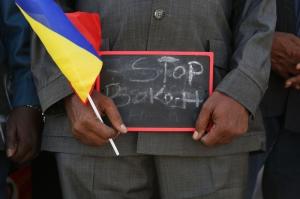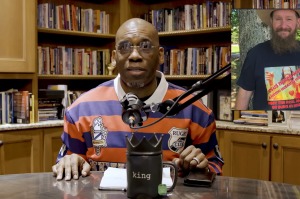Calvin Robinson says Church of England blocked his ordination for opposing 'woke' theology

An Anglican minister-in-training and prominent British TV presenter described how the Church of England hierarchy denied him a position serving in a church for speaking against critical race theory and raising concerns about Marxist ideology infiltrating the denomination.
In a recent interview with "Triggernometry" hosts Konstantin Kisin and Francis Foster, Calvin Robinson noted that though he comments on hot-button culture war issues, he does so from a faith-based perspective, with Christ at the center of everything he does.
“I think that our society is running down the wrong direction, and it has, for the last few years, been chasing wokeness,” he said. “Unfortunately, I believe the Church is also going down that path in so many ways.”
Robinson criticized how churches largely shut down during the COVID-19 pandemic, a time when people needed to have someone looking out for them spiritually. He also lamented how the Church of England has embraced critical race theory, something he vehemently opposes.
Part of the active practice of this theory is prioritizing the “lived experiences” of ethnic minorities, he said. But when he tried to offer his own experience as an ethnic minority, it wasn't well-received by those in authority. His perspective was “the wrong type,” he recounted being told, as his lived experience did not mesh well with their progressive views.
Though he found it condescending, Robinson said it was revealing because it became clear that the Anglican leadership didn't want to hear his views on various issues, including his opposition to the Church of England falling prey to the belief that its “institutionally racist,” an accusation that has intensified since 2017. Studies about the Church and England and race have found that the church is not institutionally racist, he declared.
Doctrinally, critical race theory creates a new kind of original sin, he said, one where only white people are morally culpable for certain ills. This is contrary to the broader witness of Scripture, he maintained, referencing the words of the Apostle Paul in Galatians 3:28 where he says that there is neither Jew nor Greek, male or female, but are all one in Christ Jesus.
“The Christian idea is that we’re united, that our identity is in Christ. It’s not in our immutable characteristics. Our skin color is relevant,” he said.
“The church has really doubled down,” he added.
Robinson further detailed how he discovered that church officials were emailing each other about him behind his back, scheming to keep him from advancing in his ministry work even though parishioners had given generously to fund his studies at Oxford.
“My argument has been silenced,” he said, describing how when it came to the end of his training and when he was put forward to be an assistant priest at a parish, that position was taken away.
When he asked why that happened, one of the bishops allegedly said it would be “too turbulent” for Robinson because people might complain about his views. When he pressed them further but got nowhere he filed a formal request which allowed him to see any electronic communications about him written by church officials.
“Bishops had been talking behind my back for the last couple of years before they even sent me to training. Bear in mind they had just paid $20,000 to send me to Oxford, and it’s not their money. It’s the money of the poor ladies in the pews that they’ve used to send me to Oxford. And before they sent me, they decided that they didn’t want me to be ordained.”
As far as he could see from the contents of those internal church communications, the primary reason for him being denied ordination and a ministry position was because he doesn't believe that the Church of England is institutionally racist.
“He does not agree with our politics, therefore, do we really have a place for him?,” he said, summarizing their views.
Since he has spoken out, many other laity and clergy have reached out to him privately to tell him about similar experiences that they've had with church politicking in the hierarchy. But unlike him, they don't have platforms from which to air their grievances.
Robinson accused church leaders of gaslighting him about his tone, particularly since he sees himself as a calm person who tries to exhibit compassion for all people.
Within the Church of England, he lamented that theologically liberal elites have defined the terms and set the narrative in the media and are thus largely seen as the normative standard.
Robinson said he was irritated by the way in which church leaders manipulatively linked loving God and neighbor with going along with lockdown measures that shut down churches or pressured people to get the COVID-19 shot.
“I understand why some people chose not to take it, but the Church has no place to say ‘to be a good Christian, you have to. That makes me sick.” he said, adding that this same dynamic is at play in many other issues, including transgenderism, race issues and sexuality.
Asked if he believes these political trends in the Church of England are a result of massive guilt from past atrocities committed by churches, he offered that the Church has lost sight of its message, which is the Gospel, and let the State sort out its issues. His experience within the Church of England has led him to consider that perhaps the best course for the Church should be to have a separation between it and politics.
“The Church shouldn’t be trying to chase societal norms … on any of these issues,” he said, speaking of efforts to reach young people with gimmicks. “The Church should be countercultural; it should be an alternative. To put it scripturally, it should be a shining light in an ever-darkening world around us.”
In response to his concerns, Robinson said leaders have been evasive and disingenuous toward him.
“All that has happened is that the Church has become embarrassed about the faith,” he said, noting that many have been silent on certain topics and it has led many to believe that the Church has changed its historic biblical teachings. But the Bible has not changed and can’t be changed, he added.
“And so it has stopped telling people the truth, and now people don’t know it anymore.”
Many Christians in England feel as though they have not changed but that the Church has left them, Robinson stressed, adding that he plans to plant a church in London for those who are of a similar mind and want to be small-o orthodox Anglicans.
Send news tips to: brandon.showalter@christianpost.com Listen to Brandon Showalter's Life in the Kingdom podcast at The Christian Post and edifi app Follow Brandon Showalter on Facebook: BrandonMarkShowalter Follow on Twitter: @BrandonMShow



























